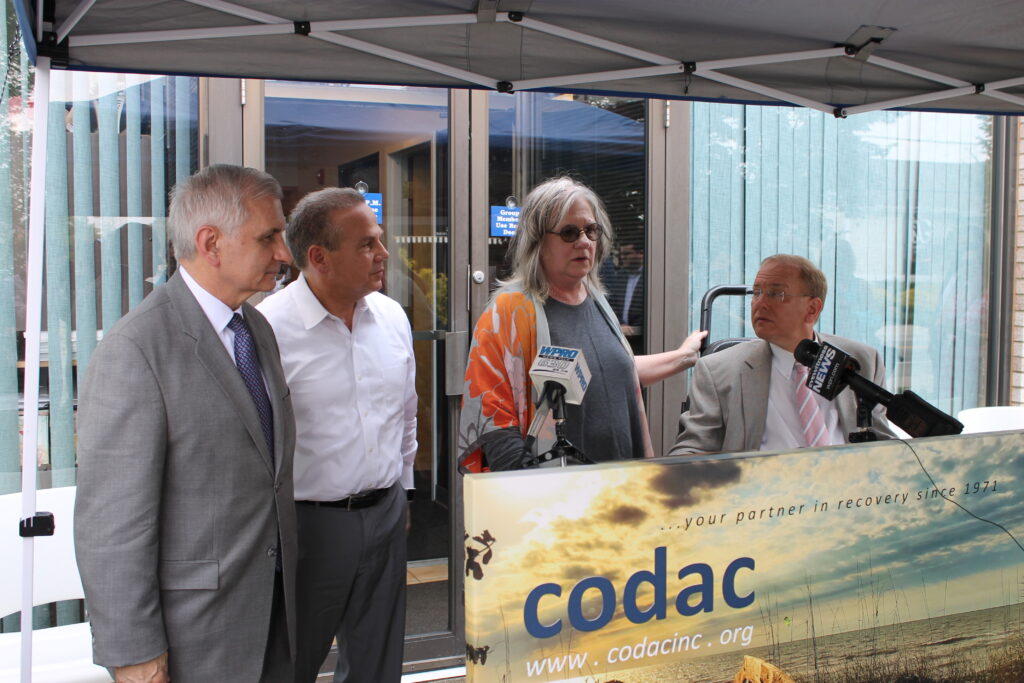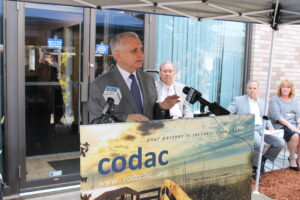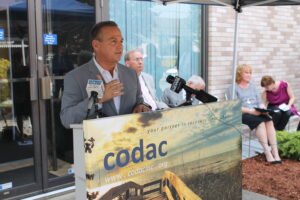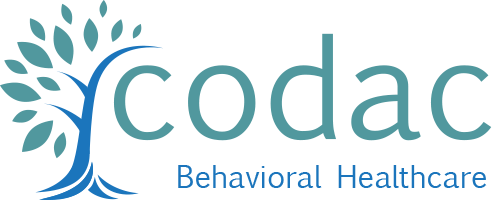RI Congressional Delegates Convene at CODAC to Announce $12.55 Million Grant to Fight Opioid Epidemic
Sens. Jack Reed and Sheldon Whitehouse worked alongside U.S. Representatives David Cicilline and Jim Langevin to help secure an additional $10 million in federal funds as part of an effort to curb the opioid crisis in Rhode Island. At an event hosted by CODAC Behavioral Healthcare, Reed says even more funding is needed.

Three of Rhode Island’s congressional delegation and gathered at CODAC to discuss the impact of a $12.55 million grant that will help families in the Ocean State overcome addiction.
By the Office of Senator Jack Reed with contributions from CODAC staff.
CRANSTON, RI (July 3, 2018) — On the heels of securing a major increase in federal funds to help address the opioid epidemic which is responsible for killing more than 100 people a day, U.S. Senator Jack Reed, Congressman Jim Langevin, and Congressman David Cicilline joined Rhode Island health professionals and others at an event calling for federal funds to be quickly deployed to the front lines for programs that are being implemented to save lives and help people recover from opioid abuse and addiction.
Today, Reed, Langevin and Cicilline joined Dr. Susan Storti, President & CEO of Substance Use and Mental Health Leadership Council of Rhode Island, Linda Hurley President/CEO of CODAC Behavioral Healthcare, and Rebecca Boss, Director of the RI Dept. of Behavioral Healthcare, Developmental Disabilities & Hospitals, to discuss the latest efforts to develop and fund effective substance use prevention, treatment, and recovery strategies that will help combat the opioid crisis.
Most of the speakers at CODAC Cranston touched on the prevalence of overdoses in Rhode Island and applauded the leadership of the state’s congressional delegation. U.S. Sen. Sheldon Whitehouse could not attend the event, but he was an ardent supporter of the Consolidated Appropriations Act of 2018.

U.S. Sen. Jack Reed discusses the need to secure more funds to reduce overdoses in the state and the importance of making treatment accessible to anyone who may need it.
CODAC Behavioral Healthcare, a non-profit that first opened in 1971 as a drug-abuse prevention program in a Cranston storefront, is now Rhode Island’s largest state-licensed addiction treatment program with eight locations across the state. CODAC provides a wide range of outpatient and off-site services to people struggling with the challenges of substance abuse, behavioral healthcare issues, and other addictive or abusive behaviors.
This past week, Reed worked with his colleagues on the Senate Appropriations Committee to include $3.7 billion to fight opioid abuse in the FY2019 Departments of Labor, Health and Human Services, Education, and Related Agencies (Labor-H) Appropriations Bill. This level of funding includes $1.5 billion for State Opioid Response Grants, a $500 million increase over FY 2018, and will increase resources for Rhode Island to combat opioid addiction. Reed says this Appropriations funding provides a flexible source of funding for states to tackle the opioid crisis with programs that best fit their needs and wants to get a firsthand look at some of the innovative and effective programs at work in Rhode Island.
This increase in federal anti-opioid funding comes on the heels of last year’s historic increase, which saw Rhode Island’s share from federal opioid grants rise from $2.1 million in 2017 to $12.55 million this year.
“Tackling the opioid epidemic requires coordination and commitment at the federal, state, and local level. I am working hard in the Senate to provide reinforcements in the battle against opioid addiction and we need to get these funds to the frontlines where they can have the most impact and help save lives. We secured historic increases in funding, but it is still only a fraction of what is needed to confront the enormity of this challenge,” said Senator Reed. “Rhode Island’s opioid campaign is having a real impact and I want to talk with experts to ensure federal funds are being wisely used and figure out how we can replicate successful programs and solutions. Tackling opioid addiction means enhancing substance abuse prevention and treatment programs like the ones here at CODAC.”
“Combatting the opioid overdose epidemic requires a whole of society effort, from health services to interdiction of illicit fentanyl,” said Congressman Langevin, whose bill to form an opioids task force at the Department of Homeland Security recently passed the U.S. House of Representatives. “The healthcare professionals at CODAC provide vital opioid addiction treatment and programming services to Rhode Islanders. Unfortunately, the need for these services still outstrips CODAC’s capacity. I commend Senator Reed for his leadership in fighting for additional federal funding to help Rhode Islanders in need. Our Congressional delegation is united in continuing to seek the resources and policy changes necessary to stem this public health crisis.”

Congressman David Cicilline described startling statistics surrounding the opioid epidemic and how robust solutions, such as the ones offered at CODAC, are needed to address the crisis.
“Rhode Island has felt the impact of the opioid crisis more than most places in our country. Although we have made progress, we all know that there is much more work left to be done,” said Congressman Cicilline, who serves on the House Bipartisan Heroin Task Force. “The only way we’re going to stop this epidemic is if every level of government – federal, state, and local – works together to implement a strategy that helps those suffering from addiction get the help they need, addresses the over-prescription of opiate painkillers, and focuses first and foremost on the preservation of human life. I’m going to continue fighting to get the resources Rhode Island needs to end this crisis.”
“These funds will provide an opportunity to continue the development of comprehensive, community-driven, multidisciplinary and recovery-oriented responses to the severity of the situations associated with the opioid epidemic,” said Substance Use and Mental Health Leadership Council President & CEO Dr. Susan Storti.
“Rhode Island currently is listed by the CDC as having the ninth highest rate of deaths from opioid overdose in the country,” said Linda E. Hurley, President & CEO, CODAC. “The good news is that Rhode Island is significantly down from the #3 spot it occupied in 2015. The $12.6 million in new funding—an increase of $10 million over last year—secured by Senators Reed and Whitehouse and Congressmen Langevin and Cicilline will allow us to continue to build on the successful strategies that have put us on this positive trajectory towards a safer and healthier Rhode Island.”
###



Recent Comments